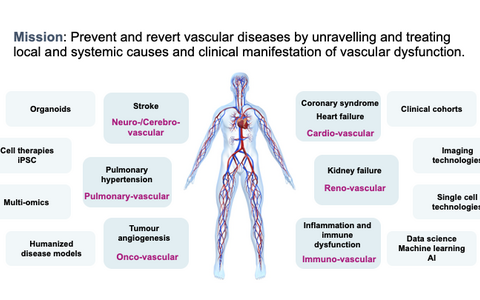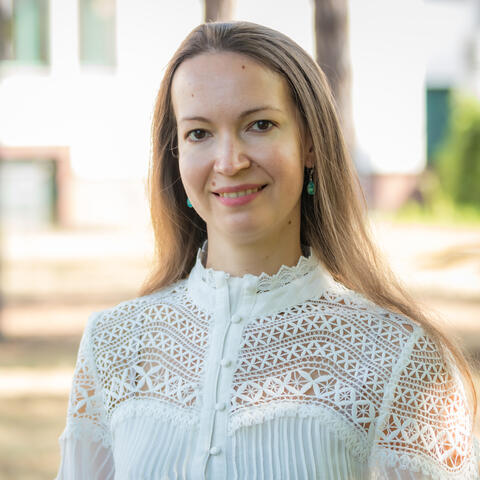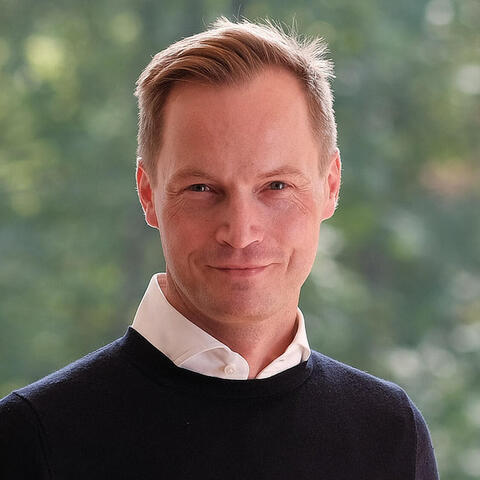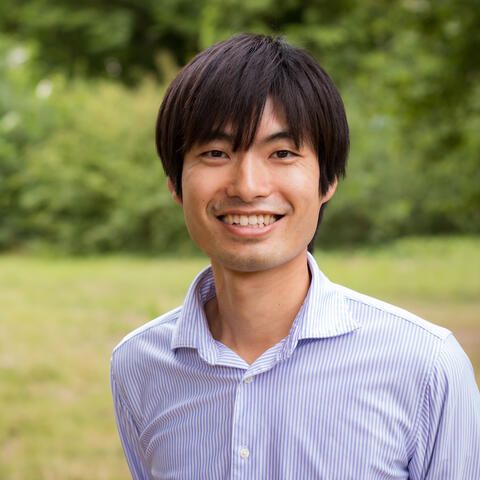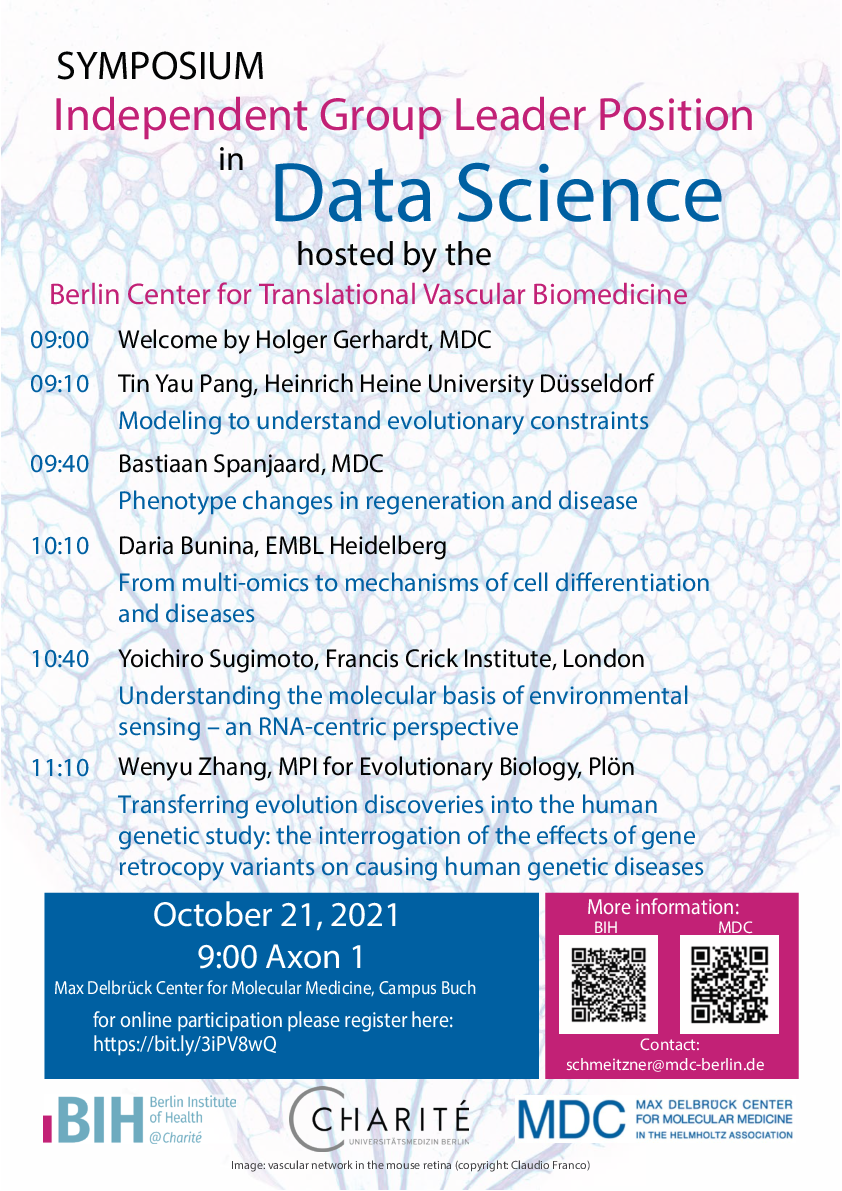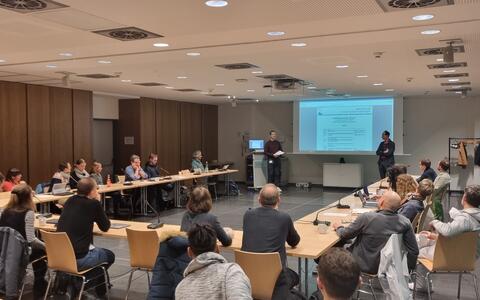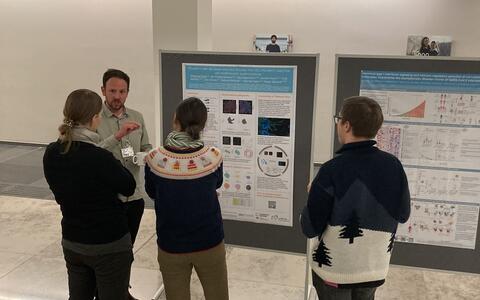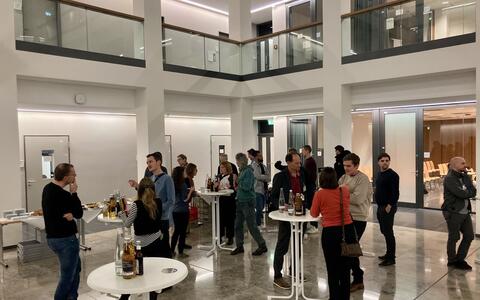
Berlin Center for Translational Vascular Biomedicine
Interdisciplinary scientific network by BIH, Charité and Max Delbrück Center
Mission and Structure
The Berlin Center for Translational Vascular Biomedicine (VasBioBerlin) integrates research activities at three major life science institutions - the Berlin Institute of Health (BIH), the Max Delbrück Center and Charité – Universitätsmedizin Berlin. With this, the Center shapes an unprecedented cluster and nucleus that connects and inspires vascular biology research activities in Berlin. Through the synergistic approach of the Center creativity, know-how and technologies are bundled to ultimately develop new therapies and personalized approaches for diagnostics and treatment of a variety of progressive diseases.
VasBioBerlin aims to prevent and revert morbidity and progressive end organ damage in vascular diseases by unravelling, conceptualizing and treating local and systemic causes and clinical manifestation of vascular dysfunction. It combines interdisciplinary experimental and clinical research on the basis of clinical cohorts, novel humanized disease models and generative computational modelling approaches.
Guided by the integrative nature, vascular research benefits from and nourishes research activities in neuroscience, cardiovascular, renal and metabolic research, immunology and cancer, pursuing cross-organ questions of vascular biomedicine and offering manifold interactions with the existing research activities in Berlin. Translational vascular biomedicine ultimately aims to develop strategies for personalized treatment of vascular diseases, inspire interdisciplinary scientists and clinicians with a translational mindset and research agenda, and train new generations of pioneering translational scientists.
Composition of the Center
The Center is governed by the Focus Area Committee, which develops the strategic direction in agreement with the Board of Directors from BIH, Charité and the Max Delbrück Center, coordinates the award of project funds within the Center and fosters the scientific exchange by hosting scientific events. The Focus Area Committee is composed of 12 senior scientists (see table below) and meets meets monthly.
Focus Area Committee
| Name | Affiliation |
|---|---|
| Holger Gerhardt (speaker) | Group leader “Integrative Vascular Biology“ (MDC), Professor for Experimental Cardiovascular Research (Charité), DZHK Professor (German Center for Cardiovascular Research), BIH Professor |
| Birgit Sawitzki (speaker) | Group leader at the Institute of Medical Immunology, Professor for Translational Immunology (BIH, Charité) |
| Michela Di Virgilio | Group leader, “Genome Diversification & Integrity “(MDC, Charité) |
| Kai-Uwe Eckardt | Director of the Department of Nephrology and Medical Intensive Care, (Charité) |
| Sarah Hedtrich | BIH Johanna Quandt Professor for Translational Human Organ Models (BIH at Charité), Department of Infectious Diseases and Respiratory Medicine (Charité) |
| Norbert Hübner | Group leader “Genetics and Genomics of Cardiovascular Diseases“ (MDC) |
| Wolfgang Kübler | Director of the Institute of Physiology (Charité) |
| Ulf Landmesser | Director of the Medical Department of Cardiology (Charité), Medical Director of the Charité Center 11 for Cardiovascular Diseases |
| Dominik N. Müller | Group leader “Hypertension-Mediated End-Organ Damage“, (Experimental and Clinical Research Center, ECRC & MDC) |
| Tobias Pischon | Group leader “Molecular Epidemiology”(MDC) |
| Michael Potente | Group leader "Angiogenesis & Metabolism" (BIH, Charité) |
| Carsten Tschöpe | Professor of Medicine and Cardiology (BIH, Charité), Vice Director of the Department of Cardiology (Charité) |
Additionally, an external sounding board with international experts from the field advises the Center regarding its international visibility, the selection of project funds and the strategic development of the Center. It is composed of the following members:
- Gabriele Bergers (VIB Leuven, Belgium)
- Keith Channon (University of Oxford, UK)
- Lena Claesson-Welsh (Uppsala University, Sweden)
- Filippo Crea (Catholic University of Rome, Italy)
- Stefanie Dimmeler (Goethe-Universität Frankfurt, Germany)
- Timothy Hla (Boston Children’s Hospital, USA)
- Klaus Ley (La Jolla Institute for Immunology, USA)
- Ton Rabelink (University of Leiden, Netherlands)
The current Core Faculty of the Center includes Prof. Holger Gerhardt (Max Delbrück Center, Integrative Vascular Biology) and Prof. Michael Potente (BIH, Angiogenesis & Metabolism). The faculty was recently expanded with the recruitment of Dr Daria Bunina (Systems biology of cardiovascular and neuronal pathologies) and Dr Yoichiro Sugimoto (Molecular mechanisms of environment sensing). All research groups are located at the Käthe-Beutler Building on Campus Buch. More information about the research groups can be found here.
Research
In order to address the deficit in translational approaches in this area, the Berlin Center for Translational Vascular Biomedicine (VasBioBerlin) integrates research activities at three major life science institutions - the Berlin Institute of Health (BIH), the Max Delbrück Center and Charité – Universitätsmedizin Berlin. Under the roof of a new research building, the Käthe-Beutler-Haus on the Buch campus, a unique translational focus is created under the joint control of basic researchers and clinicians. The aim is to decipher the local and systemic causes of vascular malfunctions so that clinical manifestations can be treated. Interdisciplinary teams work in a bottom-up approach on central issues to address the most important clinical challenges in the personalized diagnosis and treatment of vascular disease. For this purpose, cohort studies, and research on humanized disease models, as well as computer-aided modelling approaches, are combined to develop new approaches for prevention, diagnosis and therapy. Three main goals of VasBioBerlin have been defined by the community:
- Define and Treat Endothelial Dysfunction & Inflammation
- Reverse Vascular Remodeling to Improve Organ Function
- Build and Instrumentalize Vascularized Organoids
The Core Faculty of the Center includes Dr. Daria Bunina (Max Delbrück Center, Systems Biology of Cardiovascular and Neuronal Pathologies), Prof. Holger Gerhardt (Max Delbrück Center, Integrative Vascular Biology), Prof. Michael Potente (BIH, Angiogenesis & Metabolism), and Dr. Yoichiro Sugimoto (Max Delbrück Center, Molecular mechanisms of environment sensing).
Daria Bunina
Holger Gerhardt
Olaf Penack
Michael Potente
Yoichiro Sugimoto
Projects
Furthermore, the Center is financially supporting collaborative and innovative projects implementing translational pipelines that bridge basic and clinical science in vascular biomedicine. VasBioBerlin does not only provide seed funding but also supports high-risk/high-gain projects. During the first project call in June/July 2020, the Center received 27 eligible applications from researchers and clinician scientists from BIH/Charité/MDC, which were evaluated by the Center’s External Sounding Board. Based on the evaluations, the Steering Committee selected 10 projects to be funded for a two-year period.
The following projects have been selected during the first project call:
| Project Titel | Project Lead | Project Partners |
|---|---|---|
| Circulating endothelial cells as a tool to determine pneumonia patients at risk of acquiring cardiovascular diseases | Ulrich Kertzscher (Charité) | Martin Witzenrath (Charité), Norbert Hübner (Max Delbrück Center) |
| Clonal hematopoiesis and ischemic stroke | Matthias Endres (Charité) | Frederik Damm (Charité), Paulina Strzelecka (Charité), Cristopher Arends (Charité), Thomas Liman (Charité) |
| Deciphering physiological mechanisms of reverse pulmonary vascular remodeling in pulmonary hypertension | Christoph Knosalla (Charité) | Wolfgang Kübler (Charité), Norbert Hübner (Max Delbrück Center), Mariya M. Kucherenko (DZHB, Charité) |
| Expanding the application of retinal blood vessel analysis | Hanna Zimmermann (ECRC) | Oliver Zeitz (Charité), Martin Witzenrath (Charité), Oliver Peters (ECRC), Kristin Kräker (ECRC), Ralf Dechend (ECRC), Friedemann Paul (ECRC), Anja Mähler (ECRC), Stefanie Märschenz (NCRC), Sein Schmidt (Charité) |
| Gut microbiota related determinants of disease severity, risk of vascular events and clinical outcome in Covid-19 | Arash Haghikia (Charité) | Sofia Forslund (Max Delbrück Center), Andras Balogh (Max Delbrück Center), Jennifer Kirwan (MDC, BIH) |
| Mapping the renal vascular endothelium in health and acute kidney injury | Christian Hinze (Charité, Max Delbrück Center) | Kai Schmidt-Ott (Charité), Philipp Enghard (Charité), Nikolaus Rajewsky (MDC-BIMSB), Kai-Uwe Eckardt (Charité), Sebastian Bachmann (Charité), Birgit Rudolph (Charité), Jonas Busch (Charité) |
| Post-preeclampsia - common mechanisms in microvascular dysfunction cause for cardiovascular and retinal end organ damage | Ralf Dechend (ECRC) | Dagmar Kainmüller (BIH, Max Delbrück Center), Kristin Kräker (ECRC), Nadine Reichhart (Charité), Olaf Strauß (Charité) |
| T-cell-endothelium interactions in the pathophysiology of coronary- and cellular-therapy-initiated inflammatory disease | Theresa Gerhardt (Charité) | Olaf Penack (Charité) |
| The COVID-19 puzzle – The microvascular barrier as a missing piece between coagulation and organ failure | Wolfgang Kübler (Charité) | Holger Gerhardt (MDC), Philipp Mertins (MDC), Nikolaus Rajewsky (MDC-BIMSB), Martin Witzenrath (Charité), David Koppstein (MDC-BIMSB), Laura Michalick (Charité), Anna Szymborska-Mell (MDC) |
| Translational approach to understand, diagnose and treat vascular malformations | René Hägerling (Charité) | Susanne von der Heydt (Charité) |
Vascular Phenotyping
The Clinical Research Unit (CRU) of the Experimental & Clinical Research Center, a joint research institute of the Charité - Universitätsmedizin Berlin and the Max Delbrück Center, focuses on conducting clinical studies and research projects with a cardiometabolic focus. The CRU offers basic researchers and clinicians a professional environment for conducting clinical trials, including access to specialized medical equipment, trained staff and administrative support. As an important interface between medical research and patient care, our aim is to understand disease-overarching pathomechanismsand to advance the development of new therapies and potential biomarkers for early risk detection.
In close collaboration with local research groups, the CRU offers the following phenotyping tools:
- 24 h measurement of blood pressure, ECG, pulse wave velocity and activity
- Flow-induced dilatation of the brachial artery (FMD) and peripheral arterial tonometry (RH-PAT)
- Arterial vascular stiffness by pulse wave velocity (cfPWV, baPWV)
- Subcutaneous measurement of advanced glycation end products (AGEs)
- Hand grip strength by dynamometer and 6-minute-walking test
- Body composition and energy expenditure
- Disease-specific questionnaires and health-related quality of life
- Echocardiography and determination of intima-media thickness
- (Spiro-) ergometry
- Retinal imaging using optical coherence tomography (OCT) and funduscopy
- Retinal vascular function using dynamic vascular analysis (DVA)
- Whole blood staining and isolation of PBMCs
Contact:
Dr. Kristin Kräker | Clinical Research Unit
Lindenberger Weg 80 | 12135 Berlin | Charité Campus Buch
E-mail: vascular-phenotyping@charite.de
Phone: (030) 450540 328
Events
VasBio Community Workshop
On June 16, 2025 the Berlin Center for Translational Vascular Biomedicine invites its community to a special in-person workshop to reflect on five years of collaborative research and translational initiatives. Together, we will look back at key milestones—including faculty recruitments, project calls, lecture series, workshops, and the VasBioMed Board—and open the floor to new ideas and perspectives that will shape the future of vascular biomedicine in Berlin.
The event will feature six short impulse talks from members of MDC, Charité, and BIH, as well as interactive discussions focused on identifying emerging needs, fostering new collaborations, and imagining the next phase of VasBio Berlin.
Join us as we celebrate our achievements and set the course for what comes next.
- Agenda June 16, 13:00 - 15:45
13:00–13:05 | Welcome & Key Achievements & Learnings
by Birgit Sawitzki (BIH), Holger Gerhardt (MDC) and Michael Potente (BIH)
13:05–13:35 | Growing the VasBio Network
Short talks by René Hägerling (BIH/Charité) and Mahak Singhal (HI-TAC/UHEI)
13:35–14:35 | Impulse Talks: Future Perspectives in Vascular Biomedicine
Flash talks from diverse voices across the community on emerging research, new technologies, systems biology integration, translational needs, and clinical perspectives
Speakers: Anja Hauser (DRFZ/Charité), Tom Nawara (MDC), Joseph Lim (BIH/MDC), Tobias Petzold (DHZC/Charité),
14:35–14:55 | Community Discussion: Shaping the Future Together
- What elements should continue?
- What new needs, tools, or communities should be addressed?
- What could a "Phase 2" of VasBio and the VasBioMed Board look like?
- How can interactions between different institutions and organizations be enhanced (e.g., HI-TAC, DZHC, DZHK)
14:50–15:00 | Closing & Wrap-Up
15:00–15:45 | Networking
VasBio Holiday Party
Lecture Series “Vascular Networking”
Pursuing its mission, the Berlin Center for Translational Vascular Biomedicine (VasBioBerlin) initiated the Lecture Series “Vascular Networking” in February 2021 to invite distinguished experts and promote international scientific exchange to both enrich the Berlin scientific community and provide the foundation for new and visionary collaborations.
The lecture series takes place on the last Wednesday of every month at 3 pm CET. It is conducted in an online-format and attracts a broad audience from the wider Berlin community. The event comprises a 45 min talk and a 15 min open discussion followed by a 1 hour closed exchange with 3-4 interested experts.
Upcoming talk:
tba
Previous speakers:
- Katrien De Bock (ETH Zürich) - “Endothelial Metabolism and Cellular Crosstalk in the Muscle”
- Saskia C.A. de Jager (University Medical Center Utrecht) - “Inflammation in the Failing Heart: From Biomarker Towards Therapeutic Intervention?”
- Ingrid Fleming (Goethe University Frankfurt) - “Relevance of Protein Post-Translation Modification by Hydrogen Sulphide for Vascular Disease”
- Paul Riley (University of Oxford) - “Targeting the Cardiac Lymphatics to Optimise Heart Repair”
- Filippo Crea (Catholic University of the Sacred Heart in Rome) - “Mechanisms of Acute Coronary Syndromes”
- Manuel Mayr (King's College London) - "Multiomics approaches for systems biology in human cardiovascular disease"
- Mark Kahn (University of Pennsylvania) - "Signaling mechanism in cardiovascular disease"
- Anjali Kusumbe (University of Oxford) - "Vascular Control of Tissue Ageing and Regeneration"
- Claudia Langenberg (BIH @ Charité) - "What can blood-based omics deliver for clinical translation?"
- Karina Yaniv (Weizmann Institute of Science) - "Vascular heterogeneity in organ growth and regeneration"
- Sara S. Nunes de Vasconcelos (University of Toronto) - "Multicellular vascular systems as fundamental tools in discovery and regeneration"
- Hellmut Augustin (University of Heidelberg) - "Vascular mulitomics to decipher endothelial functional angiodiversity"
- Kristy Red-Horse (Stanford University) - "Development, regeneration, and repair of coronary blood vessels in the heart"
- Klaus Ley (La Jolla Institute for Immunology) - "Elongated neutrophil-derived structures in the blood circulation"
- Lena Claesson-Welsh (Uppsala University) - "Vascular Impact on Tissue Function"
- Li-Kun Phng (RIKEN) - "Combined Forces of Actin Cytoskeleton and Hydraulics in Shaping Blood Vessels"
Past Events
- 8 December 2021: Project Midterm Check-in meeting
The project leaders and partners of the VasBio-funded projects (see project table) met with members of the Focus Area Committee for a mid-term check-in meeting after the first year of the 2-year funding period. The focus of this mini-symposium was not only on the scientific progress, but also on challenges that arose due to the Covid-pandemic and other factors. This small interactive group meeting encouraged further exchange and cross-fertilization between the different projects.
- 5 November 2021: Berlin Science Week panel discussion “Cardiovascular Health in the Time of COVID-19”
As part of Berlin Science Week, members of the Berlin Center for Translational Vascular Biomedicine (Holger Gerhardt, Michael Potente and Birgit Sawitzki) discussed together with Leif Erik Sander (Charité) and Emanuel Wyler (MDC) the key aspects of cardiovascular health in context of the Covid-19 pandemic. The online panel was chaired by Vesna Todorovic, chief editor of the journal Nature Cardiovascular Research.
- 21 October 2021: Recruitment Symposium: Independent Group Leader Position in Data Science
Five candidates were invited to present their research in the field of Data Science in a half-day symposium.
- 27 January 2021: "Ocular Diagnostics of Endothelial Dysfunction", joint workshop with the Experimental and Clinical Research Center (ECRC)
The joint online workshop put current methods from ocular diagnostics into the context of endothelial dysfunction. 61 researchers and clinicians interested in current methods to study endothelial functionality and diagnose dysfunctions participated in the workshop. The diverse speaker panel presented different techniques, together with case studies, followed by an open discussion. This event rose awareness about locally available equipment and techniques to analyze endothelial functionality in humans and animal models. Furthermore, an exchange about knowledge on possible applications for population-based screens, as well as target-oriented research took place. The participants agreed that the area of ocular diagnostics offers unique opportunities to transfer scientific methods into translation and clinical use and that it is important to mirror preclinical data into the clinical situation.
- 9 December 2020: Project Workshop
One year after the kick-off event, the VasBioBerlin community met online to examine current developments and to discuss how the pandemic impacted vascular biomedical research. The focus of this workshop was the presentation of 10 research projects that had been selected for funding by VasBioBerlin. (More information of the funded project can be found here.) In breakout sessions, the participants exchanged their experiences from the pandemic and identified advantages and challenges of newly developed models and methods.
- 19 and 20 May 2020: Covid-Workshop
As a response to the COVID-19 pandemic, VasBioBerlin organized an online-workshop in 2 sessions (May 19 and 20, 2020) to encourage an interdisciplinary exchange about planned and ongoing COVID-19-related research activities in Berlin. 29 interested BIH, Charité & MDC researchers and clinicians with diverse backgrounds participated and developed concepts on how to gain a greater understanding of the endothelial and vascular component of COVID-19. Based on short presentations of their research projects and studies in session 1, participants used session 2 to discuss and develop new approaches on 1) how to analyze endothelial dysfunction phenotypes in COVID-19, 2) How to study the heterogeneity of vascular end organ involvement in COVID-19, and 3) how to model vascular pathomechanisms of COVID-19 ex vivo.
- 10 December 2019: Kick-off Workshop Translational Vascular Biomedicine
On December 10 2019, over 60 researchers and clinicians from BIH, Charité, and MDC came together for the kick-off workshop at the Berlin Institute for Medical Systems Biology (BIMSB). In the course of 20 flash talks, the participants presented current issues and unmet clinical needs in the area of vascular biomedicine. Based on the topics presented, participants subsequently split up in three interest groups, “Endothelial Dysfunction and Inflammation”, “Vascular remodeling”, and “Vascularized Organoids”, where they discussed and defined central questions and relevant diseases of the field and outlined promising translational approaches. VasBioBerlin is using the results gained in the workshop to further specify its translational aims.
VasBioMed Board
To better connect different stakeholders and to improve the basis for deeper clinical and research collaboration in vascular biomedicine, we have created the Berlin Vascular Biomedicine Board. This board consists of basic researchers and technology platform leaders as well as clinicians of diverse clinical areas. We are an open group and we are looking for participants of different career levels. So please join us.
VasBioMed Board meetings are held 3-4 times per year, bringing together local professionals interested in vascular biomedicine. Each meeting includes discussions on vascular disease patterns and patient cases from different clinics, with a focus on current techniques for diagnosis and treatment. We also highlight clinical cases and technologies that are relevant to our community, fostering shared learning and collaboration.
Our next meeting will be on Monday, September 08, 2025 at 3-5 pm at Berlin Institute for Medical Systems Biology (MDC-BIMSB), Hannoversche Str. 28, 10115 Berlin
Speakers tba.
This board meeting is hosted by Wolfgang Kübler (Charité), supported by the VasBio coordinator Tanja Florin as well as the speakers of the Berlin Center for Translational Vascular Biomedicine Holger Gerhardt (MDC) and Birgit Sawitzki (BIH).
In case you are interested to participate, please contact: Tanja.Florin@mdc-berlin.de
- Kick-off event on November 21, 2023
On November 21, 2023, a significant event unfolded at Charité – Universitätsmedizin Berlin, bringing together 38 participants, including clinicians, clinician scientists, basic researchers, and technology platform members. The event was organized by the Berlin Center for Translational Vascular Biomedicine and representatives from Charité, the Max Delbrück Center for Molecular Medicine (MDC), and the Berlin Institute of Health (BIH) were in attendance. The gathering marked the inauguration of the VasBioMed Board, an interdisciplinary vascular expert panel and an important driver for translation in the field of vascular biomedicine in Berlin.
The kick-off event aimed to establish the foundation for the VasBioMed Board by fostering collaboration and dialogue among professionals from various disciplines within the realm of vascular research and medicine.
Program Highlights:
1. Clinical Case Presentations:
The program commenced with four insightful presentations of clinical cases (see list below). Clinicians and clinician scientists, many of whom where affiliated with the Berlin Center for Translational Vascular Biomedicine shared their experiences, challenges, and innovative approaches in managing vascular conditions. These presentations served as catalysts for stimulating discussions among the participants.
2. Discussion Sessions:
Following each clinical case presentation, participants engaged in lively discussions. The interactive nature of these sessions allowed for the exchange of ideas, insights, and best practices, creating a dynamic and collaborative atmosphere.
3. Poster Presentations:
During snack and coffee breaks, participants had the opportunity to explore poster presentations showcasing various methods and technologies relevant to vascular research. This interactive format facilitated networking and the exchange of expertise among attendees.
4. Panel Discussion:
Another highlight of the event was a panel discussion focused on shaping the future of the VasBioMed Board. Together with the moderator Birgit Sawitzki (BIH @ Charité), the panelists Holger Gerhardt (MDC), Olaf Penack (Charité) and René Hägerling (Charité) deliberated on the format, framework, aim, and structure of the upcoming interdisciplinary panel. The discussion touched upon key aspects, including the board's mission, goals, and strategies for promoting collaboration across institutions.
The event proved successful in fostering connections among clinicians, researchers, and technologists in the field of vascular biomedicine. The diverse backgrounds and expertise of participants set the stage for a robust interdisciplinary collaboration.
Through the discussions and presentations, common themes and priorities in vascular research emerged. This will guide the VasBioMed Board in defining its focus areas and objectives.
Importantly, the kick-off event laid a solid foundation for the VasBioMed Board, providing a blueprint for its future activities. The insights gathered will inform the board's structure and activities in the coming months.
Clinical Case Presentations
- Microangiopathy after allogeneic stem cell transplantation (alloSCT) (O. Penack, Department of Hematology, Oncology and Cancer Immunology)
- Perioperative Management of Patients Undergoing Complex Vascular Surgery (O. Hölsken, Clinic for Anesthesiology and surgical intensive care)
- A cryptic case: isolated perivascular T-Cell Infiltration and brain edema (K. Röhrs, Clinic for Neurology with Experimental Neurology)
- Autoimmune vascular disease in the ICU: a treatment challenge (A. Schreiber, Department of Nephrology and Medical Intensive Care & ECRC)
Presented Posters
- Benefits of Retinal Imaging for Vascular Biomedicine (AG Zimmermann, ECRC)
- Canonical type I interferon signaling and immune regulatory potential of non-classical monocytes characterize the asymptomatic disease course of SARS-CoV-2 infected children (L. Petrov et al. Charité, BIH @ Charité)
- Clinical Research Unit: Cardiovascular studies (A. Mähler et al., ECRC)
- Clinical Study: InFlame – How does an inflamed gut affect vascular function (ECRC)
- Microvascular imaging as early predictor for cardiac dysfunction after preeclampsia (AG Müller/Dechend, ECRC)
- Plasma proteogenomics to inform vascular health and drug target identification (M. Pietzner et al., BIH)
- Polarity-Jam: an image analysis toolbox for cell polarity, junction and morphology identification (W. Giese et al., MDC)
- Proteomics Technology Platform Overview (L. Suarez Artiles,… P. Mertins)
- Untargeted metabolomic imaging using desorption electrospray ionization (DESI) close to single cell metabolomics (U. Bruning, J. Kirwan, BIH @ Charité)
- Previous VasBioMed Board Presentations
- Pathogenesis and advanced B cell targeted therapies for systemic sclerosis (Elise Siegert, Charité, Department of Rheumatology and Clinical Immunology)
- B-cell mediated autoimmunity in pulmonary hypertension associated with left heart disease (Szandor Simmons, Charité, Institute of Physiology, JRG Immunodynamics)
- MicroMatrix BP: Integrating Targeted qPCR and ML for Predictive Analysis (Theda Bartolomaeus, Experimental and Clinical Research Center, Müller/Dechend lab – Hypertension-mediated End-Organ Damage)
- Microangiopathy after allogeneic stem cell transplantation (alloSCT) (O. Penack, Department of Hematology, Oncology and Cancer Immunology)
- Perioperative Management of Patients Undergoing Complex Vascular Surgery (O. Hölsken, Clinic for Anesthesiology and surgical intensive care)
- A cryptic case: isolated perivascular T-Cell Infiltration and brain edema (K. Röhrs, Clinic for Neurology with Experimental Neurology)
- Autoimmune vascular disease in the ICU: a treatment challenge (A. Schreiber, Department of Nephrology and Medical Intensive Care & ECRC)
- Rare Vascular Diseases - Clinical Cases and Diagnostic Strategies (M. Danyel and R. Hägerling, Charité)
- Joint application of intravascular imaging and local immunophenotyping in acute coronary syndrome (Y. Abdelwahed and D. Meteva, Charité)
- Preventing thromboembolic events in immobile individuals: from bears to human (T. Petzold, Cardiovascular Prevention Center, Charité)
- Vascular Phenotyping in Proof-of-Concept Studies @ECRC-CRU (K. Kräker, ECRC/MDC/Charité)
- CAR T-cells for inflammatory vascular diseases – Lessons learned from a case-report. (R. Kettritz, A. Schreiber, D. Simon, ECRC/Charité):

